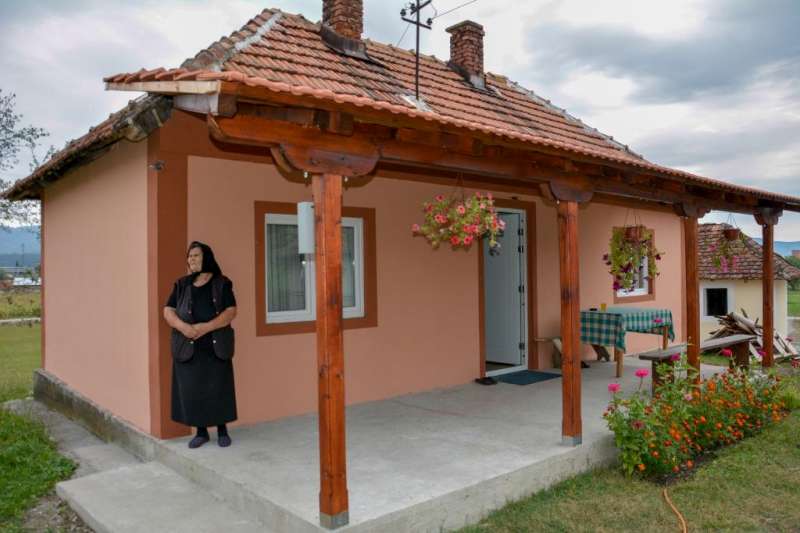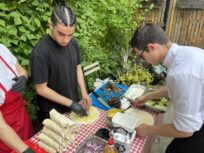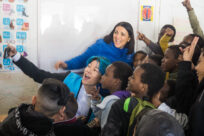Dream home comes closer for Serbian family years after fleeing Croatia
On a recent cold and misty morning, Ranko Rajković shows visitors around the converted barn where he lives in central Serbia and tells them that he just wants to tear it down and build a decent home with a separate bedroom for him and his wife.
“My [wife] Željka has been dreaming about a decent, solid house for the last 15 years,” the 54-year-old, with tears welling in his eyes, tells UNHCR in the home he and his wife share with their student son. That dream could soon come true under a regional housing scheme in which UNHCR is a stakeholder.
Ranko bought the tumbledown barn in 2002, seven years after fleeing from Sisak in neighbouring Croatia. He, Željka and son Saša, now aged 21, were among a quarter of a million ethnic Serbs who escaped to Serbia at the end of the 1991-1995 war in Croatia.
The family had moved in 1997 to Obrenovac, and have lived there ever since. Ranko soon found a steady job with a local bakery while Željka resumed her teaching career and now runs classes for primary school children. They soon decided to make their future in Serbia and applied for citizenship in 2002. “We were aware we would not return to Croatia, as we had no property to go back to,” Ranko explained.
Instead, they decided to invest in the land in Obrenovac, rather than spend money on rent. The barn was never meant to be more than a stop-gap measure for the couple, whose son studies law at Belgrade University, some 30 kilometres away, during the day.
But they never had enough money to buy or rent somewhere better and as the years passed, Željka’s dream never seemed to get any closer. Then Ranko heard about a major project aimed at ending the lingering problem of displacement in the region.
The Regional Housing Programme was launched by Bosnia and Herzegovina, Croatia, Montenegro, and Serbia in 2012 to provide durable housing solutions and sustainable livelihoods for some 74,000 people, including 45,000 in Serbia. Donors have to date pledged some 260 million euros of the estimated 600-million-euro cost, with the bulk pledged by the European Union (230 million euros).
“When I heard about the Regional Housing Programme on TV and talked to local staff of the Serbian Commissioner for Refugees, I had no doubts as to what I would do,” said Ranko, who has applied for one of an initial 70 kit houses to be built in Serbia. Apartment blocks are also being constructed or renovated under the five-year scheme, with the support of UNHCR.

Ranko is one of 80 applicants for the sturdy, well-built bungalows and if his bid is successful, he will need to apply for a location and building permit. He wants to tear down the barn and build on an adjacent site. He already has connections in place for the utilities, which will save expense on installation. UNHCR will hire local contractors to build the homes after a competitive bidding process.
Having a new house will help make the sacrifices of the past seem worthwhile as well as ensuring comfort and security as Ranko and Željka grow older. One of the reasons they could not build anything better in Obrenovac was because they were investing much of their savings in Saša’s future.
“We saved every penny we earned to put our son through school and to be able to find a permanent housing solution other than renting accommodation,” Ranko recalled. In central Croatia’s Banija region, where he grew up, Ranko was an administrator and accountant for a local school, where Željka taught. They lived in an apartment owned by the school.
On arrival in Serbia, still strong and energetic, Ranko found a job as a handyman for a bakery. With Željka’s earnings as a teacher, they were living off a monthly income of 200 euros at a time when the economy was deteriorating. They did not even have enough money to install plumbing inside the barn and had to use a tap outside to get water. In the winter, Ranko wrapped cloth around the pipe to prevent it from bursting.
They hoped that when Saša left secondary school he would learn a trade such as becoming a plumber, so that he could join the labour market as quickly as possible and help with expenses. “However, his mind was set on law and we had to give in. He commutes for nearly three hours to and from Belgrade every day in order not to miss lectures and comes home in the evening,” Ranko said.
But now they see some light at the end of the tunnel. Saša’s studying could benefit them all when he starts working, and they might soon have a new improved home. As for Croatia, it is a foreign country for the Rajkovic family – like the past.
By Mirjana Ivanović Milenkovski and Neven Crvenković in Obrenovac, Serbia
For more, please go to http://www.regionalhousingprogramme.org/22/about-international-stakeholders.html
Page 2 of 4
-

A refugee in service of refugees
28 Feb 2023Yuliya decided to come to Serbia because she was convinced it would be easier for her to integrate because of the similar culture and religion. She was right. Yuliya, a 31-year-old mother of a 7-year-old boy from Ukraine, is currently staying at Asylum Center in Vranje. Yuliya is one of […]
-

More than employment – building a new life and a better society
16 Dec 2022Picture this: you have left everything behind. You are fleeing your home, and the only certainty is that you are escaping conflict and persecution, looking for a safe haven. For many of us, it is for sure difficult to even conceive this kind of situation. Refugees are starting a new […]
-

Delicacy Monday – Food, Dance and Safe place – for Everyone
23 Sep 2022May, warm yet pleasant weather. Pots full of food – chopped, fried, cooked and stirred with love by the students from the Hospitality and Tourism School and young refugees from Iraq and Burundi, Karoh and Lorraine, are being served into the KC Grad on the Sava Pier. The sun reflects […]
-

Goodwill ambassador MIYAVI visits Serbia
8 Aug 2022By: Mirjana Milenkovski, Belgrade, Serbia “I know you! I saw you in Lebanon!!” exclaimed a little Syrian refugee boy who arrived in Serbia a couple of months ago with his parents and siblings. As life has a way of arranging it, MIYAVI and given a concert in a refugee camp […]
-

Yonas Kinde promulgates refugee power at the Belgrade Marathon
13 Jul 2022By Dragan Vukotic Running has always had a special place in the life of Yonas Kinde, Olympic marathoner and a former refugee. It had helped him to be always on time for school during his childhood years in Ethiopia and has been helping him ever since not to be late […]
-

Welcome to My Country
23 Feb 2022Refugees in the eyes of secondary school students in Serbia “I look into the eyes of this tiny refugee boy who does not understand what I am saying. I am afraid they will never feel safety and warmth of a home. But they have seen the horrors beyond my imagination.. […]
-

Information sessions help LGBTQ+ asylum-seekers find their footing in Serbia
13 Dec 2021The pride parade filled the streets of Belgrade with colours and music. Starting from Manjež park, people paraded around the city centre cheering and singing in unison. Among the cheerful crowd came Karim*, along with a few other asylum-seekers residing in Belgrade. Karim, who arrived in Serbia two years ago, […]
-

Serbian human rights lawyer fights for the rights of refugees and asylum-seekers
30 Sep 2021UNHCR has named Nikola Kovačević the UNHCR Regional Nansen Refugee Award winner for Europe for his dedication to providing legal assistance to refugees and asylum-seekers in Serbia. Nikola Kovačević starts his workday as a lawyer not in a suit, but in a T-shirt and trainers. Day and night, he stands […]
-

The Biggest Step So Far, Towards Their Future
26 Aug 2021This October, Kathia, Sebtimio, Sami and Reza will enter the classrooms of faculties in Belgrade, on a pursuit of their dreams. A big step in anyone’s lifetime, for them it is at least one size bigger – coming after many actual steps they made on their way to finding home […]
-

Language classes help young refugees in Serbia integrate more easily
16 Jul 2021Considering that studying a language is inseparable from learning about the culture of the host country, conversation classes are sometimes organized outside the classroom For Firash, 17, and Asadi, 18, who fled Afghanistan more than a year ago, learning Serbian is more than mastering a new language. It’s a gateway […]
